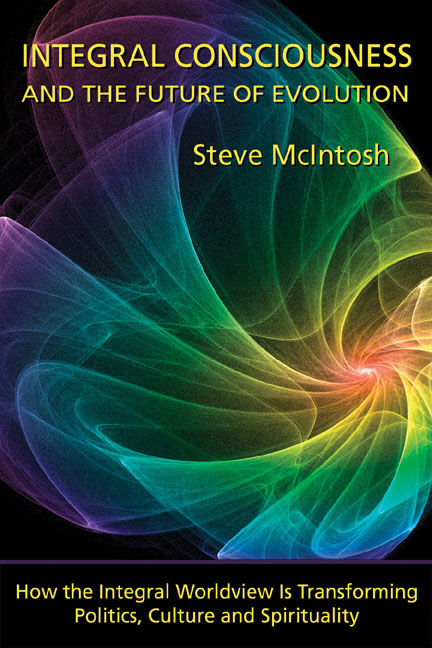"This is a very thoughtful, informed and readable book. It will be of great interest to anyone interested in the future of civilization, the planet and the universe itself. It demonstrates wide familiarity with the natural sciences, developmental psychology, political thought, philosophy and spiritual traditions. It is the sort of synthesis that we can all profit from as we face the next century."
—Dr. John Haught, Professor of Theology, Georgetown University, and author of Deeper Than Darwin.
"McIntosh makes a signal contribution to the debate on the direction and nature of evolution, one of the most fundamental issues of our time. He frames his ideas in the context of an integral worldview, likewise a critical aspect of the new understanding. His theory merits sustained consideration and development."
— Dr. Ervin Laszlo, Distinguished system scientist, President of the Club of Budapest, and author of over 30 books on evolution.
“McIntosh’s book is an educational journey through the fundamentals of integral philosophy and a fascinating exploration of some its most important themes. Carefully researched and tightly argued, this work is an important contribution to a field destined to impact world culture and the direction of human evolution.”
—Carter Phipps, Senior Editor, What Is Enlightenment?
"Integral consciousness worth learning about? If yes, should I read this book? For me, the short answer to both is 'yes'. "
—Jim Ludwig, jimludwig.com
This is really two books in one: the first half serves as an accessible and highly readable introduction to the power of integral consciousness, with the second half making a variety of original contributions to the integral perspective and breaking new ground in the application of integral philosophy to politics and spirituality. Moreover, McIntosh provides a much-needed contextualization and critique of the integral worldview's leading author, Ken Wilber, which helps make integral philosophy relevant to a larger audience.
(Video: Excerpt from What Is Enlightenment? interview on integral philosophy. .)
TABLE OF CONTENTS
Part I The Main Narrative
CHAPTER 1
Introduction to Integral Consciousness
CHAPTER 2
The Internal Universe
The Evolution of Consciousness
The “Within of Things”
The Systemic Nature of Evolution
CHAPTER 3
Stages of Consciousness and Culture
The Spiral of Development
Tribal Consciousness
Warrior Consciousness
Traditional Consciousness
Modernist Consciousness
Postmodern Consciousness
The Spiral as a Whole
What Is the Real Evidence for the Spiral?
CHAPTER 4
The Integral Stage of Consciousness
Life Conditions for Integral Consciousness
The Values of Integral Consciousness
Integral Consciousness in the Context of History
Practicing the Integral Lifestyle—Value Metabolism
Postintegral Consciousness
CHAPTER 5
Integral Politics
The Politics of the Spiral
Integral Politics and Global Governance
Is Global Governance an Unrealistic Fantasy?
Is Global Governance Too Dangerous—What are the Safeguards?
Global Governance and Integral Consciousness Cocreate Each Other
CHAPTER 6
Integral Spirituality
The Development of Spiritual Traditions
Public Spirituality in the Integral Age
Beauty, Truth, and Goodness—Philosophical Spirituality
The Practice of Beauty, Truth, and Goodness
The Revelation of Evolution
Part II
A Deeper Discussion
Introduction to Part II
CHAPTER 7
The Founders of Integral Philosophy
Ken Wilber in Context
The Evolution of Philosophy as a Human Endeavor
Hegel—the First Integral Philosopher
Bergson—the First Post-Darwinian Integral Philosopher
Whitehead—Spiritual Philosopher for the Ages
Teilhard de Chardin—Master of the Internal Universe
Gebser—Prophet of Integral Consciousness
Developmental Psychology and the Mapping of the Internal Universe
Habermas—Architect of Integral Foundations
Wilber—Framer of Integral Philosophy’s Twenty-First-Century Synthesis
What I Add to Integral Philosophy
CHAPTER 8
The Integral Reality Frame
Metaphysics and the Evolution of Reality Frames
The Integral Map of Reality
Integral Philosophy and Human Spirituality
Some Critiques of the Integral Reality Frame
CHAPTER 9
Structures of the Human Mind
Lines of Development Recognized by Psychologists
Wilber’s Theory of the Lines of Development
A Critique of Wilber’s Theory of Developmental Lines
An Alternative Theory of the Structures of Consciousness
The Self as a Whole
CHAPTER 10
The Directions of Evolution
Evolution and the Idea of Progress
Unity, Complexity, and Consciousness
Directions of Evolution in the Internal Universe
The Dialectical Quality of the Master Patterns of Evolution
Potential Applications of a Dialectical Understanding of Evolution
Appendix A
A Proposal for Integral Global Governance
Appendix B
Consideration of Wilber’s Four-Quadrant Model of Evolution
Bibliography
Index






